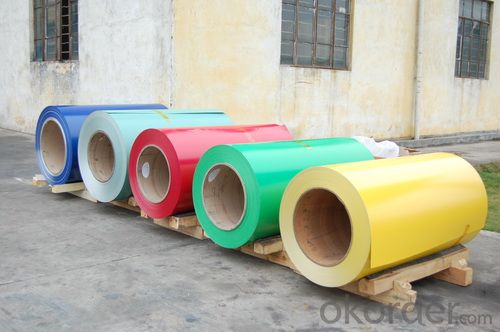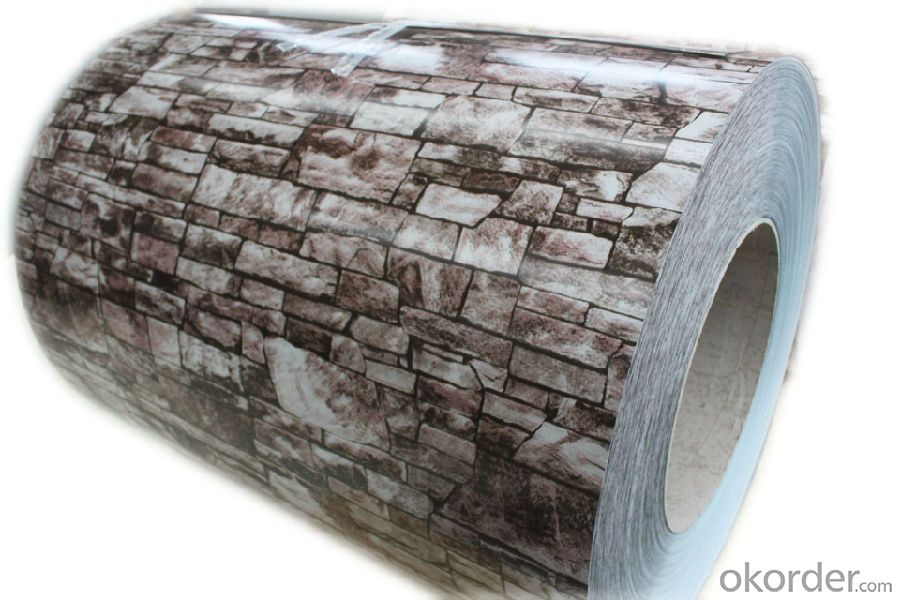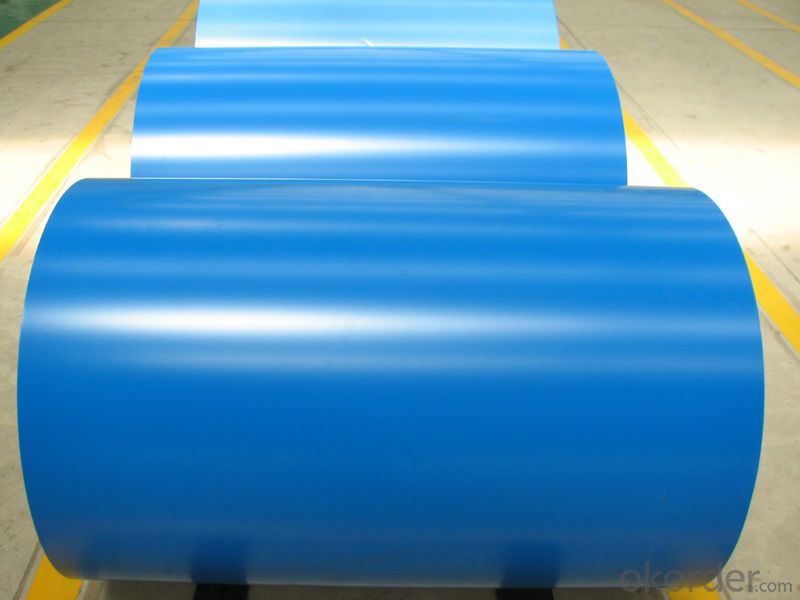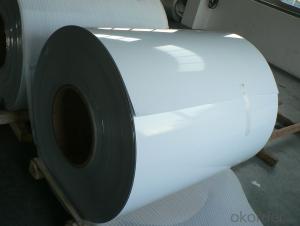White Color Coating Aluminum Coil with High Quality
- Loading Port:
- Shanghai
- Payment Terms:
- TT OR LC
- Min Order Qty:
- 5 m.t.
- Supply Capability:
- 10000 m.t./month
OKorder Service Pledge
OKorder Financial Service
You Might Also Like
Item specifice
1. Specification of White Color Coating Aluminum Coil with High Quality
Material | Alloy Aluminum 6063,6061,6005 or customer nominated |
Temper | T3, T4, T5, T6 |
Surface | Anodize, electrophoresis, powder coating, PVDF coating, wood grain painting, matted, etc. |
Colour | Any colour based on Standard Germany RAL Mark |
Length | Coating 6.5 meters, Anodizing 6.5 meters, Mill finish 5 meters |
Press Machine | 500-4000 tons all together 64 press lines. |
Fabrication | 1. Windows and doors; 2. Drilling; 3. Bending; 4. Cutting; 5. etc. |
Certificate | ISO 9001 |
Moulding | 1. Using our moulds, no fee; |
2. Using customer drawing, opening mould, usually about 10~50 tons then the moulding can be refunded. | |
3. Mould cost is negotiable base on the order quantity | |
Capability | Annual output 100,000 tons |
2. Application of White Color Coating Aluminum Coil with High Quality
(1).Interior: wall cladding, ceilings, bathrooms, kitchens and balconies, shutters, doors...
(2).Exterior: wall cladding, facades, roofing, canopies, tunnels,column covers , renovations...
(3).Advertisement: display platforms, signboards, fascia, shop fronts...
3. Feature of White Color Coating Aluminum Coil with High Quality
*Such coil is specially designed to replace aluminum ingot, due to the high export tax of aluminum ingot, the coil has better price than ingot.
*This type of coil can fit customer's remelting furnace just like ingot, no need to make any change to the production line that was previously used for ingot. The standard coil size and weight is very suitable for the feed gate of furnace.
*This type of coil causes less material wastage than ingot when remelted.
*Our coil is made directly from ore, no need to go though the ingot making process, quality is much better than other suppliers who use ingot scrap to make coil.
Be free from Oil Stain, Dent, Inclusion, Scratches, Stain, Oxide Dicoloration, Breaks, Corrosion, Roll Marks, Dirt Streaks and other defect which will interfere with use
4. Certificate:
SGS and ROHS(if client request, paid by client), MTC(plant provided), Certificate of Origin(FORM A, FORM E, CO), Bureau Veritas and SGS (if client request, paid by client), CIQS certificate
5. Image of White Color Coating Aluminum Coil with High Quality



6. Package and shipping of White Color Coating Aluminum Coil with High Quality
eye to wall
eye to the wall
with wood pallet (wooded case also available)
7. FAQ
1) What is the delivery time?
Dpends on actual order, around 20 to 35 days
2)What is the QC system:
We have QC staff of 20 persons and advanced equipment, each production is with MTC traced from Aluminum ingot lot.
3) What market do you mainly sell to?
Australia, America, Asia, Middle East, Western Europe, Africa etc
- Q:How are aluminum coils used in the manufacturing of household appliances?
- Aluminum coils are used in the manufacturing of household appliances as they provide excellent conductivity, durability, and corrosion resistance. These coils are commonly used in appliances such as refrigerators, air conditioners, and heating systems. They help in transferring heat efficiently, improving energy efficiency, and ensuring the longevity of the appliance. Additionally, aluminum coils are lightweight, making them easier to handle during the manufacturing process.
- Q:What are cold rolling aluminum coil and hot rolling aluminum coil? What are their features?
- If the rolling temperature is above the crystallization one, it is hot rolling, otherwise it is cold rolling.
- Q:What are aluminum coils used for?
- Aluminum coils are commonly used in various industries, such as construction, automotive, and HVAC, for their excellent thermal conductivity and corrosion resistance properties. They are primarily used for manufacturing heat exchangers, air conditioning systems, refrigeration units, and other heat transfer applications.
- Q:Are aluminum coils suitable for insulation applications?
- Yes, aluminum coils are suitable for insulation applications. Aluminum is a popular choice for insulation due to its excellent thermal conductivity properties. It effectively reflects heat and cold, making it an efficient material for insulating applications. Additionally, aluminum coils are lightweight, durable, and resistant to corrosion, making them suitable for various insulation needs. They can be easily installed and provide long-lasting insulation performance. Overall, aluminum coils are an excellent choice for insulation applications.
- Q:Can aluminum coils be fabricated or machined?
- Yes, aluminum coils can be fabricated or machined. Aluminum coils are typically used in applications such as heating, ventilation, and air conditioning (HVAC) systems, automotive radiators, and electrical transformers. These coils can be fabricated or machined to meet specific requirements and dimensions. Fabrication of aluminum coils involves processes such as cutting, bending, and welding to create the desired shape and size. This allows for customization and adaptation to various applications. Machining, on the other hand, involves removing material from the aluminum coil using cutting tools such as lathes, mills, or CNC machines. This process is used to achieve precise dimensions, smooth finishes, and intricate designs. Overall, aluminum coils are versatile and can be fabricated or machined to suit different needs. The flexibility of aluminum as a material makes it a preferred choice for many industries, offering durability, lightweight properties, and excellent thermal conductivity.
- Q:What is the lifespan of aluminum coils?
- The lifespan of aluminum coils can vary depending on various factors such as the quality of the aluminum, the manufacturing process, the environmental conditions they are exposed to, and the maintenance provided. However, on average, aluminum coils can last anywhere from 15 to 30 years. With proper care and regular maintenance, including cleaning and inspection, aluminum coils can potentially have an extended lifespan. It is important to note that regular maintenance and servicing by professionals can help identify any issues early on, allowing for timely repairs or replacements, ultimately prolonging the lifespan of aluminum coils.
- Q:What are the factors that determine the price of aluminum coils?
- There are several factors that determine the price of aluminum coils. One of the main factors is the cost of raw materials. The price of aluminum is influenced by factors such as supply and demand, global economic conditions, and production costs. Fluctuations in these factors can directly impact the price of aluminum coils. Another factor that determines the price of aluminum coils is the manufacturing process. The cost of processing aluminum into coils involves various expenses such as labor, energy, and equipment. The complexity of the manufacturing process and the efficiency of the production line can affect the overall cost, which in turn influences the price of aluminum coils. Market conditions also play a crucial role in determining the price of aluminum coils. Factors such as market competition, industry trends, and geographic location can impact pricing. For instance, if there is a high demand for aluminum coils in a particular region but limited supply, the price may increase due to the scarcity of the product. Additionally, transportation and logistics costs contribute to the final price of aluminum coils. The distance between the manufacturing facility and the customer, as well as the mode of transportation, can affect the shipping expenses. These costs are typically factored into the overall price of the coils. Lastly, government policies and regulations can influence the price of aluminum coils. Tariffs, import taxes, and trade agreements may impact the cost of importing or exporting aluminum coils, thereby affecting the final price. In conclusion, the price of aluminum coils is determined by various factors including the cost of raw materials, manufacturing processes, market conditions, transportation costs, and government policies. It is essential for manufacturers and consumers to consider these factors when analyzing and forecasting the price of aluminum coils.
- Q:What are the fire resistance properties of aluminum coils?
- Aluminum coils have excellent fire resistance properties due to the unique characteristics of the metal. Aluminum has a high melting point of 660 degrees Celsius (1220 degrees Fahrenheit), which allows it to withstand high temperatures without deforming or melting. In addition, aluminum forms a thin layer of oxide on its surface when exposed to air, which acts as a protective barrier against fire and prevents further oxidation. This oxide layer has a high melting point and is non-combustible, making it an effective fire retardant. Furthermore, aluminum is a poor conductor of heat, meaning it does not readily transfer heat during a fire, which helps to slow down the spread of flames. Therefore, aluminum coils are widely used in various applications where fire resistance is a crucial requirement, such as in building construction, transportation, and electrical wiring.
- Q:Can aluminum coils be used in the production of automotive body panels?
- Yes, aluminum coils can be used in the production of automotive body panels. Aluminum is a lightweight and durable material that offers excellent corrosion resistance, making it ideal for automotive applications. The use of aluminum coils helps to reduce the weight of the vehicle, resulting in improved fuel efficiency and overall performance.
- Q:What are the potential risks of using aluminum coils in specific applications?
- Using aluminum coils in specific applications presents several potential risks. Firstly, due to its high reactivity, aluminum can undergo oxidation and form aluminum oxide. While this oxide layer can be protective, it can break down in certain environments, like acidic or alkaline conditions, leading to corrosion and compromising the coils' structural integrity and lifespan. Secondly, aluminum coils have lower strength compared to metals like steel, making them vulnerable to deformation or damage under heavy loads or high pressure. Mechanical stress can cause bending or cracking, resulting in potential failure. Furthermore, aluminum has a relatively low melting point compared to metals like copper or iron. As a result, when exposed to high temperatures, such as in heating or cooling systems, there is a risk of the coils melting or deforming, leading to system malfunctions, reduced efficiency, or safety hazards. Another risk lies in the electrical conductivity of aluminum coils. While aluminum conducts electricity well, its resistance is higher than copper. This can lead to increased power losses and reduced energy efficiency in electrical applications. Additionally, aluminum coils may be more prone to electrical arcing or sparking, posing a fire hazard. Lastly, it is important to note that aluminum is lightweight, which can be advantageous, but it also means that aluminum coils may have lower durability and resistance to physical impacts or external forces compared to heavier metals. In environments with vibrations, impacts, or other mechanical stresses, the coils may be more susceptible to damage or premature failure. In conclusion, although aluminum coils offer benefits like light weight, good thermal conductivity, and corrosion resistance, it is vital to carefully consider the potential risks associated with their use in specific applications. Proper design, maintenance, and compatibility with operating conditions are crucial to mitigate these risks and ensure the safe and effective performance of aluminum coils.
1. Manufacturer Overview |
|
|---|---|
| Location | |
| Year Established | |
| Annual Output Value | |
| Main Markets | |
| Company Certifications | |
2. Manufacturer Certificates |
|
|---|---|
| a) Certification Name | |
| Range | |
| Reference | |
| Validity Period | |
3. Manufacturer Capability |
|
|---|---|
| a)Trade Capacity | |
| Nearest Port | |
| Export Percentage | |
| No.of Employees in Trade Department | |
| Language Spoken: | |
| b)Factory Information | |
| Factory Size: | |
| No. of Production Lines | |
| Contract Manufacturing | |
| Product Price Range | |
Send your message to us
White Color Coating Aluminum Coil with High Quality
- Loading Port:
- Shanghai
- Payment Terms:
- TT OR LC
- Min Order Qty:
- 5 m.t.
- Supply Capability:
- 10000 m.t./month
OKorder Service Pledge
OKorder Financial Service
Similar products
New products
Hot products
Related keywords





























